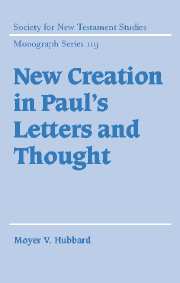Book contents
- Frontmatter
- Contents
- Acknowledgments
- List of abbreviations
- 1 Introduction: the current debate
- PART I NEW CREATION: CENTRAL JEWISH TEXTS
- Part II FROM DEATH TO LIFE: NEW CREATION IN THE CONTOURS OF PAUL'S THOUGHT
- 5 From death to life: insights from cultural anthropology
- 6 Newness of life: Romans 6.1–11
- 7 Newness of the Spirit: Romans 7.1–6
- 8 Spirit, newness, life: the Pauline antecedents
- 9 Crucified with Christ: Galatians 2.19–20
- Part III THE OLD AND THE NEW: NEW CREATION IN THE CONTEXT OF PAUL'S LETTERS
- References
- Index of passages cited
- Index of modern authors
7 - Newness of the Spirit: Romans 7.1–6
Published online by Cambridge University Press: 02 December 2009
- Frontmatter
- Contents
- Acknowledgments
- List of abbreviations
- 1 Introduction: the current debate
- PART I NEW CREATION: CENTRAL JEWISH TEXTS
- Part II FROM DEATH TO LIFE: NEW CREATION IN THE CONTOURS OF PAUL'S THOUGHT
- 5 From death to life: insights from cultural anthropology
- 6 Newness of life: Romans 6.1–11
- 7 Newness of the Spirit: Romans 7.1–6
- 8 Spirit, newness, life: the Pauline antecedents
- 9 Crucified with Christ: Galatians 2.19–20
- Part III THE OLD AND THE NEW: NEW CREATION IN THE CONTEXT OF PAUL'S LETTERS
- References
- Index of passages cited
- Index of modern authors
Summary
In Paul's thought, redemption and liberation signified in the final analysis a reaction against death … Yet the connection between the law and sin meant that salvation was perceived initially in the form of freedom from the law and sin.
H. J. Holtzmann, Lehrbuch der neutestamentlichen TheologieContext
As noted earlier, the rhetorical question of 6.1, “Shall we remain in sin …?,” casts its shadow at least as far as 7.6, and is probably not fully answered before the end of chapter 8. In refuting this false inference, Paul yokes his argument to three analogies, baptism (6.3), slavery (6.16), and marriage (7.2–3). Each of these is introduced by the formulaic “Do you not know?” (6.3; 6.15; 7.1), revealing three distinct but closely connected literary segments: 6.1–14, 15–23; and 7.1–6. Like ever-widening concentric circles, the analogies broaden to address the readers from different perspectives: as Christians (baptism), as Romans (slavery), and as humans (marriage).
The analogy of 7.2–3 represents a daring step in the argument, though one which Paul has been maneuvering to make since the opening chapter: Ο δE δίκαιος Eκ πίστεως ζήσεται(1.17). To be sure, the word νΟμς is not absent from chapters 1–6, but Paul has yet to look Moses in the eye without blinking. He does so here. In describing the law as that which brings the knowledge of sin (3.21), works wrath (4.15), increases transgression (5.20), stands opposed to grace (5.20–21; 6.14), and so on, Paul was preparing the ground for the startling declaration in 7.4: “My friends, you have been put to death with respect to the law”.
- Type
- Chapter
- Information
- New Creation in Paul's Letters and Thought , pp. 104 - 112Publisher: Cambridge University PressPrint publication year: 2002



